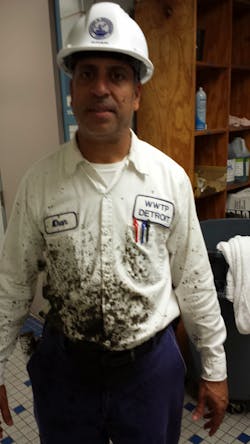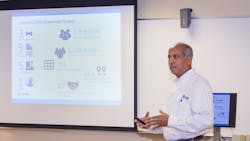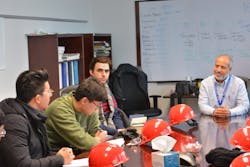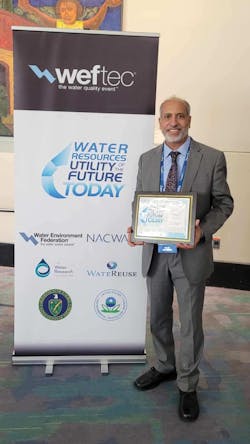Industry Icon: GLWA Wastewater Operations Director Dr. Majid Khan
He did not always work in an office. In fact, he keeps a reminder of his roots just to the side of his computer monitor. Peering at the photo, he sees a younger and vibrant self, albeit one with just as much passion. He’s wearing a white hard hat and a white shirt to match, although it doesn’t look so white anymore as a splash of sludge covers his right side.
While his face doesn’t show it in the photo, a small smile sneaks from the corner of his mouth now, a recollective smirk that he too experienced the industry’s rite of passage.
At the time of that photo, Dr. Majid Khan was sewage plant supervisor for Great Lakes Water Authority (GLWA). In his more than 25 years of service to the industry and GLWA, he has risen through the ranks to wastewater operations director. Despite that rise to authority and success, Dr. Khan makes every effort to humble himself and his achievements.
To his colleague, John Norton, and to his supervisor, Navid Mehram, this humility is inspiring, and it lays the groundwork of his leadership and influence, not only within GLWA, but also the industry at large.
“Majid carries a lot of pride,” said Mehram, chief operating officer for GLWA. “He’s a respectful person. He respects everyone, doesn’t matter what level you are. You get the same level of respect.”
This characteristic of the 2022 WWD Industry Icon carries beyond just the professional sphere. In his spare time, Khan enjoys walks through nature. He particularly enjoys hiking to a higher vantage point where he can revel in the beauty of nature and the valleys before him. Even in hiking, he humbles himself with the world before him. What’s more, that humility is rooted in his passion for water.
Fascination With Water
Khan, 58, was born and raised in India. Water and electricity were scarce at times, so his upbringing was founded on a culture of resource conservation. By his own admission, he was fascinated by by water. And that curiosity nearly got the best of him at a young age.
“I was seven or eight years old … and jumped into the canal,” Khan recalled. “[I] tied something on my back and the rope came loose. So I’m almost drowning. Somebody rescued me. But I never stopped getting attracted to the water.”
In college, he learned to swim at his university’s Olympic-sized swimming pool with a coach. More importantly, he began his studies, which resulted in a masters degree in organic chemistry. But the more he learned about the synthesis of chemicals, the more he was drawn to their impact on the environment. This led him to pursue a Ph.D. in which he chose to research plastic and rubber waste for environmental protection reasons.
That research became the foundation of a presentation he gave at the Pittsburgh Conference for Analytical Chemistry — more commonly known as PittCon — in New Orleans in 1993. It was his first trip to the United States, and after returning home, he was promoted to a scientist level. Two years later, he immigrated to the U.S.
Unfortunately for Dr. Khan, his immigration occurred around the same time as the 1995 government shutdown. With reduced job prospects and Ph.D. in Chemistry, he took a position as a junior chemist for the Detroit Water & Sewerage Department. It was this position that deepened his fascination with water.
“I got interested in how the results that I’m producing, the samples I’m running, how these results are helping in tweaking the operations process of this plant,” Khan said. “So a couple years later, I took the wastewater operators certification course.”
This certification was not required for his position, but it drove him to pursue a more important role in wastewater operations. He climbed his way through the ranks. In 2012, a new executive director reorganized the structure of the utility, and then in 2013, Detroit made national news.
The city was going bankrupt, and rumors circulated among city workers.
“Another rumor was that after the bankruptcy, the pensions will go away, and if they stay, they will calculate the pay rate on basic pay, straight salary. Overtime will not be included in the pension calculation,” Khan said, adding a number of workers who were near retirement, left the utility at the time to secure their pensions as a result. To Khan, the adversity of the moment was an opportunity. It presented a choice: leave or stay.
“It became a challenge. We did not even have enough folks to even run the plant 24/7 and maintain permit compliance,” Khan said. He stayed, and that moment shaped the future of his career.
Challenges Are Opportunities
As workers left the utility, he found himself promoted to manager of the wastewater treatment plant. A side effect of the departures, however, was that Majid now had to wear a lot of hats.
“If you see, a lot of my hair is gone here and it’s all grey,” he said with a laugh, noting he managed operations and maintenance as well as the more than 10 lift stations for the utility.
In the first four years after that promotion, he worked 12- to 16-hour days on salary to ensure the safety of public health. Many asked why he stayed, despite the long hours and sacrifice to his family and personal life.
“My perspective is that when challenges come in life, either you can take the challenge and make it into an opportunity, or you can walk away from that challenge,” Khan said. That the leadership trusted him to rise to the occasion was motivation as well.
But he stayed, and was able to take part in all of those achievements and opportunities. Trust was placed in him to carry out big goals, and Mehram said Khan could not be better suited for it.
“I depend on him a lot. I sleep comfortably at night,” Mehram said. “I’m responsible for all of wastewater and I’m comfortable with things that he has put in place, and knowing how responsible he is, he will deal with those issues.”
Khan’s track record of excellence and dedication is long. His involvement in industry organizations includes Michigan Water Environment Association, Michigan Cleaner Lake Erie through Action and Research, and the GLWA Wastewater Master Plan Steering Committee, among many others. The aforementioned phosphorus reduction strategy was a hallmark of his career, and his continued involvement in master planning steering for wastewater at GLWA shows just how valuable he is at the highest level in the organization.
A Leader by Example
Having a high level of trust from supervisor earns authority. Mehram said Khan leads through respect for all workers, regardless of their title or position. He also leads through pride in their work and achievements.
“In my role, sometimes I tend to be running 100 miles per hour … but Majid has done a good job of sometimes reminding me to make sure that we recognize and celebrate our successes,” Navid said. “That has helped me as an individual, as well.”
Khan knows the trials and tribulations of those working for him because he lived through those experiences. He has worn all their hats and he empathizes with their struggles. Because of that background, he aims to be a role model who can also mentor and guide his employees to success.
During the pandemic, he was offered to work remotely, and he refused so he could be a better leader.
“If I expect others to come on site, I can only ask them to if I can do it myself,” Khan said. “I don’t want to miss an opportunity where I can take that moment to coach them, to educate them, to develop them.”
Integrity, transparency and honesty are all core qualities he equates with good leadership. To be a good leader, he said one has to earn the respect of those working for them rather than rely on a title given by the organization.
Leaders, he added, are always observed. For better or worse, all actions big and small are noticed. Leading by example, he said, is his way of ensuring he sends the right messages at the right times.
And even Mehram takes notice. His supervisor said Khan finds ways to relate to all GLWA workers on not only a professional level, but a personal one as well.
“It’s kind of crazy, but Majid actually knows the name of 90% of the plant operators and plant staff,” Mehram said. “I would say we have close to 400 individuals, and when we have a potluck, Majid will actually, by first name, reference many of them.”
Industry Icons are not built on their actions alone. They surround themselves with people who make them more successful and share their values. They lead by example and instill trust into those they work with. And for those 400 people whose first names he remembers at the next potluck, Khan could not be more iconic.






